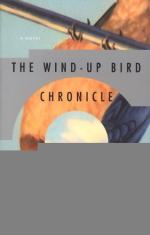|
This section contains 811 words (approx. 3 pages at 300 words per page) |

|
SOURCE: “Intimate Encounters,” in New Statesman, Vol. 128, No. 4462, November 15, 1999, p. 54.
In the following review, Reyburn assesses the strengths of Murakami's storytelling in The Wind-Up Bird Chronicle.
The Japanese novelist Haruki Murakami is one of the most compellingly original voices in world literature. Born in Kyoto, in 1949, the son of a Japanese army veteran of the second world war, Murakami used to run a jazz bar before publishing a series of weird and wonderful novels whose commercial and critical success have earned him superstar status in his native land.
The English-speaking world has taken longer to catch up with him. His novels have been fitfully available in translation (just two are currently in print in Britain) and it was not until last year's publication of the epic The Wind-Up Bird Chronicle—a surreal journey through the dark interior of a damaged marriage, set against the even darker backdrop of...
|
This section contains 811 words (approx. 3 pages at 300 words per page) |

|


